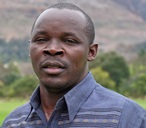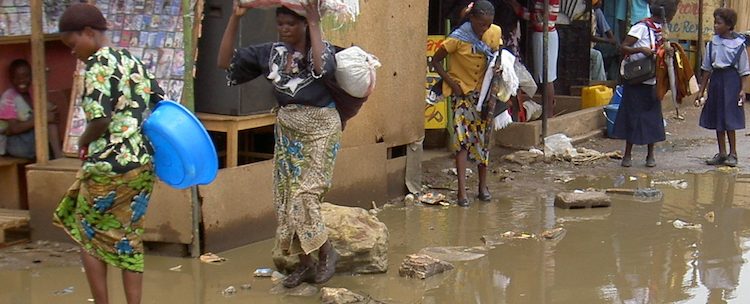“We experience flooding every year, we lose life and we cannot solve these problems alone. […] Civic leaders, City Council officials and researchers need to speak the same language and find solutions together.” Kanyama Ward Councillor, 14th November 2017, Nakatindi Hall, Lusaka.
Everyone in Lusaka still remembers vividly the rains that flooded the city and the country ten years ago. In the first months of 2009 Zambia experienced the worst floods in 40 years, causing loss of lives, displacing over 20,000 families, and damaging agricultural fields, roads and buildings. Since then, every year during the rainy season, downpours leave highly populated areas of Lusaka submerged with ankle deep water for weeks on end.
“Climate change, and the heavy rains that hit the city, are obviously one of the main causes of the floods. However, many people fail to acknowledge the role that infrastructure and governance play in driving and worsening the situation,” says Dr. Gilbert Siame, Lecturer and Researcher at the University of Zambia, and Director of the Centre for Urban Research and Planning.
“Some areas of the city have developed informally and lack proper structures to drain excess water. And another major issue is the management of solid waste – garbage that is left uncollected ends up blocking the drainage systems.”
Through a grant provided by START under the Future Resilience for African Cities and Lands (FRACTAL) program, Gilbert’s team has looked into flooding in two of Lusaka’s flood prone wards, Kalikiliki and Kanyama, with a particular focus on the role of waste management. “Efforts to improve the management of solid waste need to be driven by a grassroots movement. As part of this project, researchers from the University of Zambia and representatives from the City Council have involved the communities at all stages – from identifying the problems, to collecting and analyzing data, to proposing solutions,” explains Gilbert. “This co-production approach ensures that we ask and answer research questions together, and that the research outcomes will be comprehensive and immediately actionable.”
Residents, researchers and municipal authorities developed together solutions that will increase the efficiency of the current waste management process, lowering the risk of flooding. A new flood preparedness and response model that embeds waste management was also co-developed during the project, bridging gaps between actors involved in solid waste management and flood response at all levels in Lusaka.
“Some of the recommendations from the project have already been implemented, for example removing secondary dump sites – waste is now taken directly from the communities to the designated dumpsites, improving the quality of urban environments and reducing flood risk in the city. Other recommendations, such as waste separation, remain to be implemented,” explains Gilbert. “The future looks bright though. Thanks to FRACTAL we have connected with several stakeholders within the city, and we are continuing to work with various institutions on different projects. For instance, the city asked us to participate in the development of Local Area Plans for 12 city wards. We will also keep convening quarterly mini-learning labs during FRACTAL’s extension period, and we are actively participating in bids for research grants to continue implementing some of the FRACTAL innovations in the city.”
“One of the major takeaways from the project is that some solutions to urban flooding do not need more money, but more commitment from stakeholders,” concludes Gilbert. “The energy in the room, when we all came together to discuss the research findings and how they will improve daily life in the community, was absolutely inspiring. The ties that have been created between the Lusaka City Council, the University of Zambia and the communities are a precious asset that will last and may be useful to solve other challenges in the future. The project also showed the importance to develop climate solutions for African cities that are people-centered and address urban climate risks and reduce poverty.”

Dr. Gilbert Siame is Lecturer and Researcher at the University of Zambia, and Director of the Centre for Urban Research and Planning.



